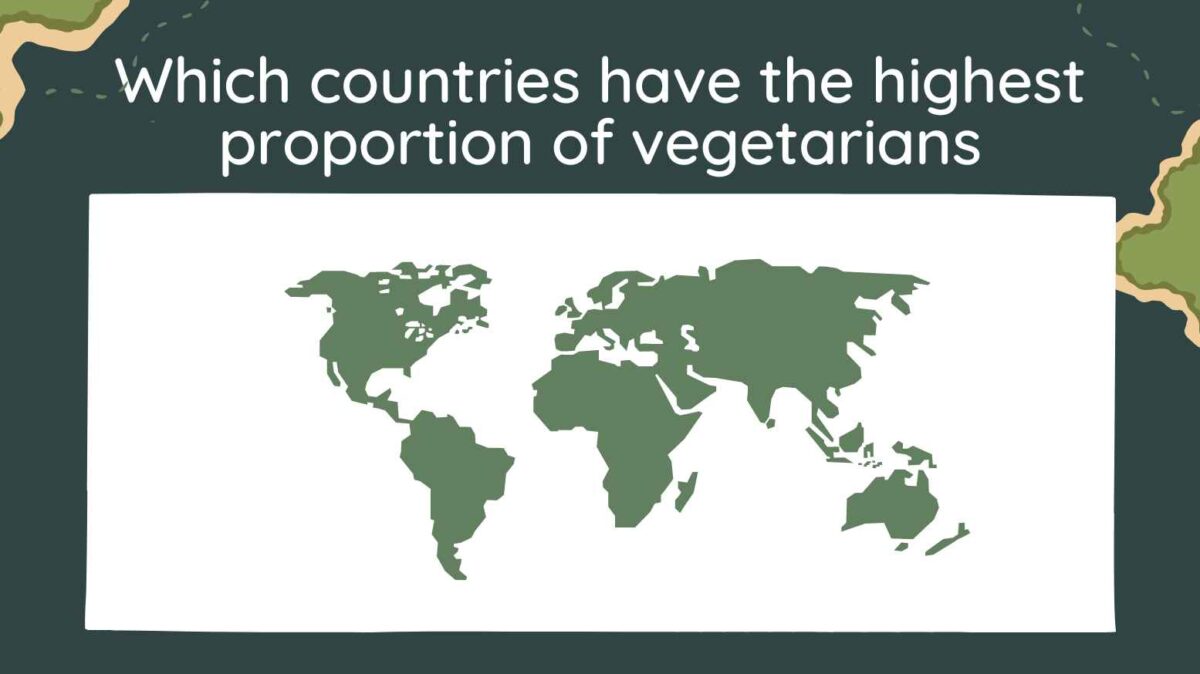Globally, vegetarianism is becoming more popular due to reasons including environmental concerns, ethical dilemmas, and health consciousness. This gastronomic tour takes us around the globe to find the nations where the percentage of vegetarians is highest while also examining the social, cultural, and historical influences on these dietary preferences.
India

With a significant 31% of its people following a vegetarian diet, India is at the forefront of vegetarianism. Ancient theological and philosophical ideas, especially those that emphasize non-violence (ahimsa) and respect for all living things, are the foundation of this dietary decision. In India, lacto-vegetarianism—which permits the use of dairy products but forbids the consumption of eggs—is the most common type of vegetarianism.
Cultural Significance

In India, being a vegetarian is not just a matter of eating; it has deep cultural implications. The two main Indian religions, Hinduism and Jainism, place a strong emphasis on compassion for all living things and nonviolence. These ideas have been passed down through the years, affecting food habits in a variety of social groups.
Regional Variations
Vegetarianism is popular, although the kinds of vegetarian food vary depending on the area. For example, South Indian cuisine often includes more vegetarian options, with a focus on rice and lentils, while North Indian cuisine features a variety of vegetarian curries and bread.
Taiwan

With 13.2% of its population vegetarian, Hakka and Buddhist customs have a big influence. In addition to being a personal decision, vegetarianism is also pushed by the “one day vegetarian every week” campaign. By encouraging individuals to switch to a plant-based diet for one day a week, this movement promotes a fusion of ecological living and cultural values.
Hakka and Buddhist Influences
Taiwan’s vegetarian culture is greatly influenced by the compassion and nonviolence of Buddhism. Furthermore, the Hakka population, which is renowned for emphasizing natural and simple living, adds to the appeal of plant-based diets.
Culinary Diversity
The variety of vegetarian options available in Taiwanese cuisine highlights the adaptability of plant-based foods. Taiwan’s culinary traditions include tofu-based meals and vegetable stir-fries landscape reflects a harmonious coexistence of tradition and modernity.
Germany

A significant 9% of people in Germany are vegetarians, which is indicative of a rising trend in environmental consciousness. Concerns for animal cruelty, the environment, and alleged health benefits are common reasons for adopting plant-based diets in Germany.
Environmental and Ethical Considerations
The increase in vegetarianism in Germany can be attributed to a great awareness of environmental issues as well as ethical issues surrounding animal husbandry. The nation has seen a rise in programs that support cruelty-free and ecological living.
Influence on Culinary Scene
As vegetarianism gains popularity, it has changed Germany’s food scene by encouraging the availability of more plant-based foods in eateries and grocery stores. Plant-based elements are being used to rethink traditional German recipes to accommodate the population’s changing nutritional choices.
Austria & Italy

Vegetarian populations are on the rise in both Austria and Italy, where they make up 9% and 8% of the population, respectively. These European countries manage to combine age-old cooking customs with modern eating habits in a balanced way.
Cultural and Ethical Influences
The acceptance of vegetarianism is heavily influenced by ethical and cultural factors in Austria and Italy. Growing knowledge of the effects of dietary choices on animal welfare and the environment coexists with a love for local, fresh ingredients and culinary traditions.
Gourmet Evolution
Home cooks and chefs in Austria and Italy are experimenting with plant-based ingredients as part of a gourmet revolution. To satisfy the tastes of a growing number of people who are morally and health-conscious, traditional foods are being reimagined.
Between 5 and 7 percent of people in several nations, including Greece, Switzerland, Israel, the United States, and the United Kingdom, demonstrate an increasing understanding and acceptance of vegetarianism.
There are many vegetarian communities in these countries because of cultural diversity, ethical concerns, and health consciousness. The worldwide movement towards plant-based lifestyles is indicative of a broader trend towards sustainable and conscientious eating habits.
These nations’ vegetarian communities are having an impact on the food scene. The world’s perspective on food consumption is changing, and restaurants, supermarkets, and the food industry are adjusting to meet the need for creative and varied plant-based solutions.
You may also like:
- Why do people go vegan
- Are animals killed in the process of farming vegan foods
- Is a vegan diet the ideal human diet
FAQs
1. What percentage of the population in India follows a vegetarian diet?
India leads in vegetarianism with a significant 31% of its population adhering to a vegetarian diet. The ancient theological and philosophical ideas, emphasizing non-violence and respect for all living things, form the foundation of this dietary choice.
2. What cultural significance does vegetarianism hold in India?
Vegetarianism in India goes beyond dietary choices; it has deep cultural implications. The major religions, Hinduism and Jainism, place strong emphasis on compassion for all living things and nonviolence, influencing food habits across various social groups.
3. How does vegetarianism vary regionally in India?
While vegetarianism is widespread in India, the types of vegetarian food vary by region. For example, South Indian cuisine often includes more vegetarian options, focusing on rice and lentils, while North Indian cuisine features a variety of vegetarian curries and bread.
4. What influences the vegetarian culture in Taiwan?
Taiwan showcases a vegetarian population of 13.2%, influenced by Hakka and Buddhist customs. The “one day vegetarian every week” campaign encourages plant-based choices and reflects a fusion of ecological living and cultural values.
5. How do Hakka and Buddhist influences contribute to vegetarianism in Taiwan?
Taiwan’s vegetarian culture is significantly influenced by Buddhist principles of compassion and non-violence. Additionally, the Hakka population, known for emphasizing natural and simple living, adds to the appeal of plant-based diets.
6. What impact does vegetarianism have on Germany’s culinary scene?
Germany demonstrates a noteworthy 9% of the population adopting vegetarian diets, driven by concerns for animal cruelty, environmental impact, and perceived health benefits. This shift has influenced the culinary scene by promoting the availability of more plant-based foods in eateries and grocery stores.
7. How are Austria and Italy balancing traditional cooking customs with modern eating habits?
In Austria and Italy, where vegetarian populations make up 9% and 8%, respectively, the acceptance of vegetarianism is influenced by ethical and cultural factors. The nations manage to combine age-old cooking customs with modern eating habits, leading to a gourmet evolution where traditional foods are reimagined.

